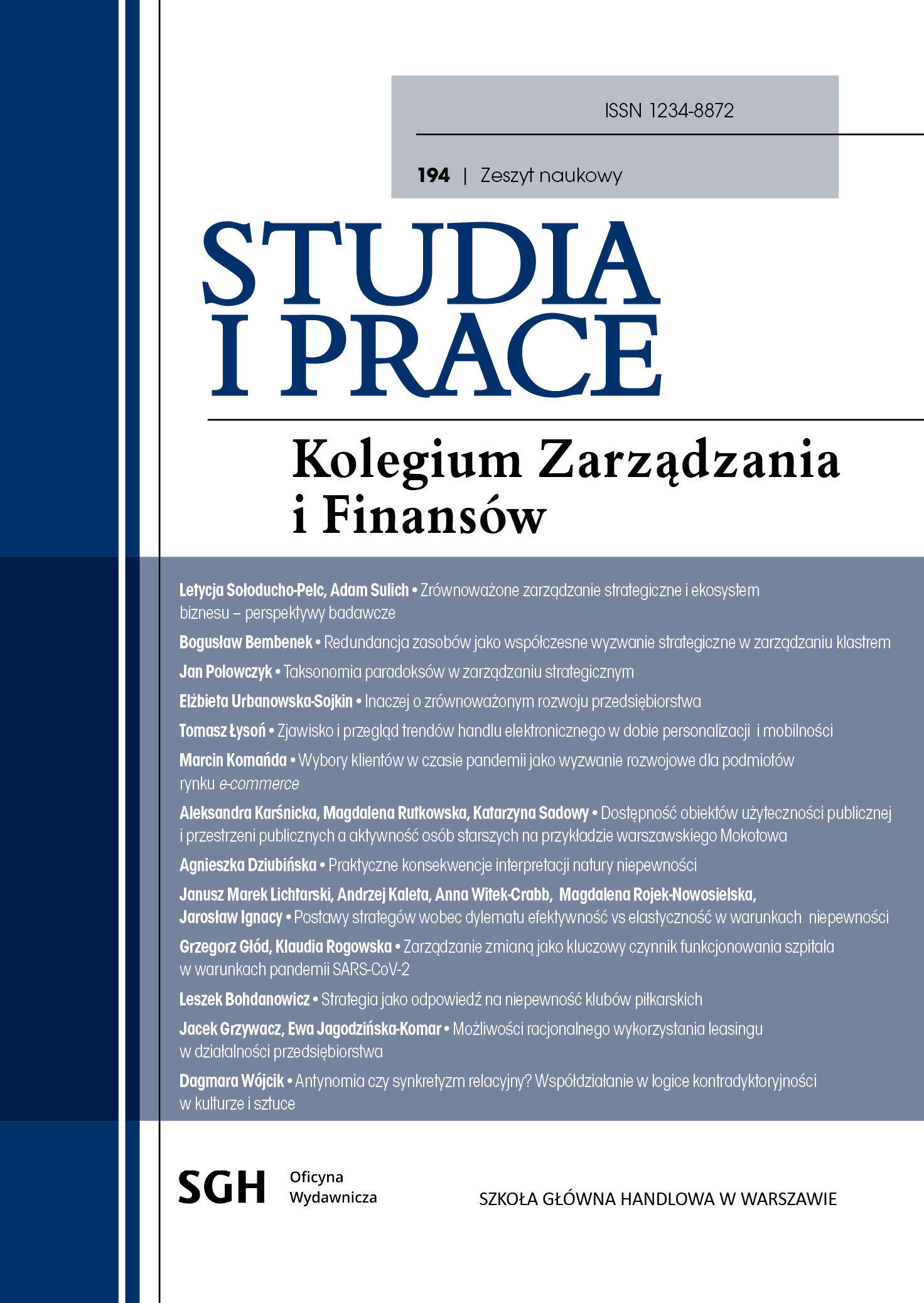Strategy as an answer to uncertainty of football clubs
DOI:
https://doi.org/10.33119/SIP.2023.194.11Keywords:
football club, uncertainty, strategic managementAbstract
Football clubs, just as other organizations, face the growing uncertainty of their business environment. This uncertainty results from the instability of macroeconomic circumstances and the changes taking place among their competitors. More and more frequently, the owners and managers of football clubs are trying to build resilient organizations by implementing different elements of strategic management, following suit of organizations from other branches. This paper is conceptual in nature, and it aims to present the model of strategic management process in a football club as well as the model of sports department strategy. Moreover, it includes a description of the basic changes taking place in the business environment of football clubs and suggestions how to respond to them.
Downloads
References
Wydawnictwa zwarte
Bohdanowicz, L. (2022). Praktyka zarządzania klubem piłkarskim. Strategia – struktura – tożsamość. Warszawa: CeDeWu.
Czakon, W. (2020). Krótkowzroczność strategiczna menedżerów. Kraków: Wydawnictwo Uniwersytetu Jagiellońskiego.
Davidsen, M., Hammer, D. (2021). How Hard It Can Be? Strategies in Football: On and off the Pitch. Dragør: Zuma.
Draebye, M. (2020). Strategic Management in Football Organisations. W: Routledge Handbook of Football Business and Management (s. 171–185), S. Chadwick, D. Parnell, P. Widdop, Ch. Anagnostopoulos (Eds.). New York: Routledge.
Artykuły naukowe
Antonioni, P., Cubbin, J. (2000). The Bosman Ruling and the Emergence of a Single Market in Soccer Talent, European Journal of Law and Economics, 9 (2), s. 157–173.
Bauers, S., Lammert, J., Faix, A., Hovemann, G. (2020). Club Members in German Professional Football and Their Attitude towards the ‘50+1 Rule’. A Stakeholder-Oriented Analysis, Soccer and Society, 21 (3), s. 274–288.
Chadwick, S., Clowes, J. (1998). The Use of Extension Strategies by Clubs in the English Football Premier Leagues, Managing Leisure, 3, s. 194–203.
Cyfert, S., Janicki, M. (2014). Zastosowanie koncepcji modelu biznesu do opisu logiki funkcjonowania klubu piłkarskiego, Marketing i Rynek, 5, s. 287–294.
Fernandez-Navarro, J., Fradua, L., Zubillaga, A., Ford, P., McRobert, A. (2016). Attacking and Defensive Styles of Play in Cocker: Analysis of Spanish and English Elite Teams, Journal of Sport Science, 34 (24), s. 2195–2204.
Hamil, S., Walters, G. (2010). Financial Performance in English Professional Football: ‘An Inconvenient Truth’, Soccer and Society, 11 (4), s. 354–372.
Hewitt, A., Greenham, G., Norton, K. (2016). Game Style in Soccer: What Is It and Can We Quantify It?, International Journal of Performance Analysis in Sport, 16 (1), s. 355–372.
Kornai, J., Maskin, E., Roland, G. (2003). Understanding the Soft Budget Constraint, Journal of Economic Literature, 41, s. 1095–1136.
Ludvigsen, J. (2019). Foreign Ownership’ in the Premier League: Examining Local Liverpool Fans’ Perception of Fenway Sports Group, Soccer and Society, 20 (4), s. 602–625.
Ocasio, W., Kraatz, M., Chandler, D. (2023). Making Sense of Corporate Purpose, Strategy Science, 8 (2), s. 123–138.
Rohde, M., Breuer, Ch. (2017). The Market for Football Club Investor: A Review of Theory and Empirical Evidence from Professional European Football, European Sport Management Quarterly, 17 (3), s. 265–289.
Storm, R. (2009). The Rational Emotions of FC København: A Lesson on Generating Profit in Professional Soccer, Soccer and Society, 10 (3–4), s. 459–476.
Storm, R., Nielsen, K. (2012). Soft Budget Constraints in Professional Football, European Sport Management Quarterly, 12 (2), s. 183–201.
Downloads
Published
How to Cite
Issue
Section
License
Copyright (c) 2024 Studies and Work of the Collegium of Management and Finance

This work is licensed under a Creative Commons Attribution 4.0 International License.









